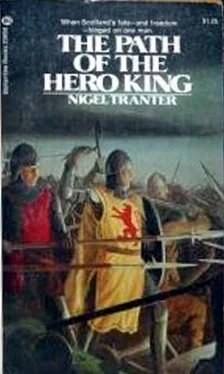They could see the tip of St. Ninians Kirks tower from here, but Morays force was not in view. Time-it was always timing that counted. Could they be in time? And would Hereford wait?
The first hint of action the watchers gained was from the enemy.
Clifford had halted, facing almost due west now. Then his long straggling column began to fan out and form into some sort of line abreast over the marshy ground, no longer following the burns edge. It was clear that they had seen something the Kings group could not see.
Moray must be down! Bruce exclaimed.
The English prepare to attack.
Then the Scots began to appear, from the dead ground at the foot of St. Ninians hill, just where the Pelstream Burn passed out of view, banners brave amongst them, but looking a rabble nevertheless.
They were this side of the burn. What chance have they? Hay
demanded.
Foot against cavalry. They must be ridden down …
They have a chance. If Moray holds them tight. Remember Wallace at Falkirk. The schiltroms held. The English cannot charge strongly in bog …
This last was very obvious, even from more than a mile off.
Distant trumpets shrilled, and in some sort of extended order, Cliffords cavalry began to advance again. But it was no charge, and no true line could be kept.
The Scots could be seen to be forming, now, into a single great square, based on the Pelstream ford. So their backs were secure, at least; only three sides might be attacked. The bristle of their long spears, thrust out like a hedgehogs spikes, could not be seen from this distance-but they could be visualised. Morays and Hugh Rosss standards flew above the eight-packed ranks.
It was a strange battle to watch, so remote, so slow-motion. Like the cumbrous waves of a heavy tide, the cavalry lapped and swirled and seethed around the rock of the packed spearmen, unable to gain sufficient space or hard ground for the charging impetus they required, while the Scots had to adopt a purely defensive role. Moray was the right man for that, however. If anyone could hold those dense ranks tight, disciplined, unyielding either to panic or the temptation to rush out and break position, he could.
Bruces glance often turned in the other direction, southeast instead of northeast. The main English van remained stationary, neither sending further reinforcement for Clifford nor itself moving out along the road towards the high-ground Scots positions.
Either there was division in policy amongst the commanders, or the orders to await the arrival of the King and Pembroke, with the heavy chivalry, were paramount.
How long the struggle at the Pelstream Burn lasted, none could have told-but it seemed endless. Had Clifford had archers, all would have been otherwise of course; but lacking them, it was almost stalemate. At one stage, admittedly, it seemed as though the English were achieving a breakin, the schiltrom sagging in front until, at least from a distance, it appeared nearly divided. The watchers fretted helplessly and then perceived a division of cavalry spurring over the higher ground, this side of St. Ninians, Douglass well-known banner at their head. But Douglas halted there, on the lip of the descent, and waited, inactive but yet a threat. He could see the position better, and presumably decided that Moray did not actually require his intervention. He was obeying Bruces commands to the letter.
Presently it was apparent that the English advantage was indeed not sustained, and the schiltrom restored to its proper shape. And gradually a new element in the battle became evident; a great bank of fallen horseflesh, dead and dying, was building up in front of the ranks of spearmen, helping to protect the Scots. No doubt there were fallen men amongst the beasts, but inevitably it was the horses that took the brunt of the punishment from that savage frieze of pikes, rather than their mail-clad riders.
This grim barrier of their own slain obviously became an increasing obstacle to the enemy. Still they continued to attack, but noticeably the pace flagged, intervals lengthened.
Clifford is held! the King declared, at length.
He cannot break Moray, and cannot cross the burn. He must turn back.
Praise God-that fight is ours also!
Soon it was apparent that Clifford perceived the fact as clearly as Bruce. A trumpet sounded the recall, out there on the flats, and the English cavalry, having lost perhaps a third of their number, drew off.
Reforming, they turned heavily to ride back whence they had come. The
sound of throaty cheering came echoing across the Carse -and everywhere
reechoed along the Scots positions.
Whatever the result of the greater battle, there we have seen something men will wonder at for long, Bruce told his companions.
I have not heard, in all the story of war, where infantry have defeated a greater force of mailed cavalry in the open field. If Moray does naught else, he has had his hour, I say!
But by your contriving and devising, Sire, Hay pointed out.
The King shook his head.
Morays glory is not thereby lessened.
Some time later, with the sun already sinking behind the Highland Line to the northwest, Moray, with Hugh Ross, was summoned to the monarchs presence, to receive a very different welcome from the last.
Your chaplet is secure again, my lord, Bruce said, holding out his hand.
Would that I might add to it. But I am in no position to do so, this day-since my own wears none so well, as you will hear!
But I thank you, and yours, in the name of all. Had you failed, and Clifford won behind us to Stirling and the bridge, we could I think, have but prayed that we might die bravely tomorrow, all of us. We may so have to do, for the main battle is still to be fought. But our rear is secure and our spirit high-thanks to you.
I but obeyed Your Graces orders, his nephew said, flushing.
For the rest, I have not even blooded my sword! Sir Hugh also.
AH was done by my stout spearmen. Very well so. It is as it should
be. You have proved better commanders than I, today. We shall see if I can do better tomorrow!
Tomorrow, Sire? James Douglas had come up, to add his tribute to Randolph, whom he had so chivalrously refrained from aiding lest any of his glory be diluted. There are still two hours of daylight And a midsummer night…
See there, Jamie, Bruce said, pointing.
King Edward has come, at last, with his main force. There will be no attack tonight, I swear. The English have much talking to do! Having waited so long, Hereford will not attack now that the King is here. And Edward will be in no state, after long marching, to throw in his army just arrived. At this hour. We have tonight.
The Scots stood to their arms for another hour and more, nevertheless, as ever more of the vast array of power and might came into view. It was a tremendous, a terrifying sight-although scarcely so for Bruce himself, whose commanders eye was inevitably taken up with the problems and logistics of it all. That enormous mass of men and beasts crowding in over the Bannock Burn, and stretching far out of sight beyond-where were they to be put?
That night? The terrain just would not hold them.
Presently the King burst out with a mighty and wondering oath.
The English van, so long stationary, had started to move again-but not now in battle array, or towards the foe. They were moving down into the Carse, slowly, in troops and squadrons and columns, picking their way amongst the pools and pows, the runnels and ditches, spreading out over the wide marshlands. On and on they went, and on and on others came after them, to appropriate any and every island and patch of firm ground, to settle and camp for the night. Down into that great triangle of waterlogged plain, rimmed by the Bannock Burn, the River Forth and the escarpment of St. Ninians, went the flower of Englands chivalry and score after score of thousands of her manhood, in an unending stream.
Читать дальше












